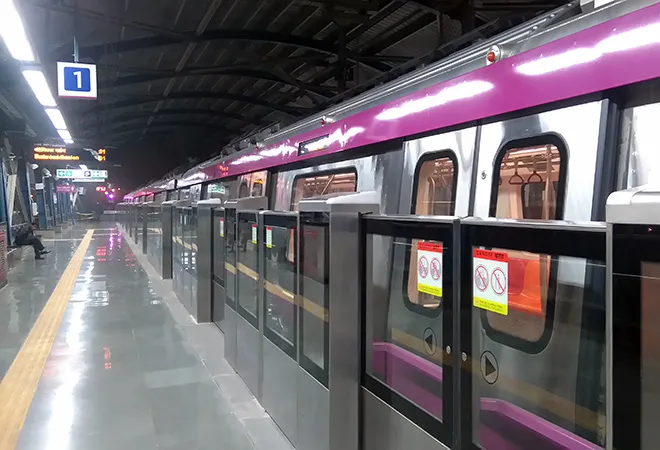-
CENTRES
Progammes & Centres
Location
Metro policy is a well-thought-out plan but it has left some gaps, which are bound to pull down the whole process

A sturdy urban transport mechanism is a very important constituent of a happy and comfortable urban experience. In India it becomes all the more essential because it has been one of the most neglected facets of governance under various governments. The rapid pace at which India is urbanizing since the 1990s has further accentuated this neglect.
Issuance of a long-awaited Metro rail policy by the Union government in 2017 was hence a welcome change from the meandering development in this sphere happening all over the country till now. The policy contains some very clear directives for undertaking Metro rail projects in various urban centres. Details of how Metro projects should be developed, funded and sustained have been well thought out and spelt. Yet it has left some gaps which are bound to pull down the whole process.
The Metro Rail Policy 2017 has laid out three significant conditions for catalyzing development of Metro rail systems. One, hitherto it will be the responsibility of the state governments to explore and choose various options for urban mobility and then implement the project. Two, a comprehensive mobility plan (CMP) is a mandatory prerequisite for planning Metro rail in any city. And, three, there should be a statutory body called Unified Metropolitan Transport Authority (UMTA) for ensuring an integrated approach in planning and management of urban transport.
It is said that there is always a devil in details. And, that is where this policy of 2017 slips. There should be a condition in the policy that unless UMTA is created as a statutory body and adequately staffed, no Metro project should be taken up in that state. Also, the CMP should be prepared and issued by the statutory body only, and no other agency. An accurate CMP can help in assessing the viability of a Metro rail project, since, it is critically dependent on integration of secondary and tertiary transport feeder services. UMTA should ideally have powers to regulate fares for all urban transport units and prepare, monitor and audit the CMP.
Fixing fares in a Metro system is of paramount importance. No Metro line anywhere in the world is financially remunerative. The policy has rightly directed that social and economic viability, too, should be assessed and be a part of the whole analysis. But, more clarity is needed on how the viability gap will be bridged, while ensuring Metro fares do not become a pawn in a political slugfest. It should be clearly stated that any state government desirous of implementing a Metro project in the state must first put a fare fixation committee in place in accordance with the Metro Railways Act, 2002. No effort in bringing PPP investments can be fruitful unless this is done.
The policy has listed various options that could be adopted to serve any urban town with a mass rapid transit system (MRTS). But, the experience of the last one year shows that every state government is going in for only Metro rail systems irrespective of the anticipated passengers per hour per direction (PPHPD) figure. The policy has correctly guided that this option suits only those routes where a PPHPD figure of 40,000-80,000 is expected. It is apprehended that many projects of Metro rail sanctioned in 2018 may become unviable after completion and require financial support. This is happening since a realistic CMP is not in place. The Metro Rail Policy 2017 should have prohibited any such move and it devolves upon the central government to hold back all such projects.
There is an urgent need for introducing these amendments to the policy to ensure that the MRTS projects are finalized after a holistic assessment. This will also ensure that projects run smoothly once they are put into operation.
This commentary originally appeared in Live Mint.
The views expressed above belong to the author(s). ORF research and analyses now available on Telegram! Click here to access our curated content — blogs, longforms and interviews.

Ameya Pimpalkhare is an Associate Fellow at ORFs Mumbai Centre. He works on the themes of energy and transportation. His key research interests include: sustainable ...
Read More +